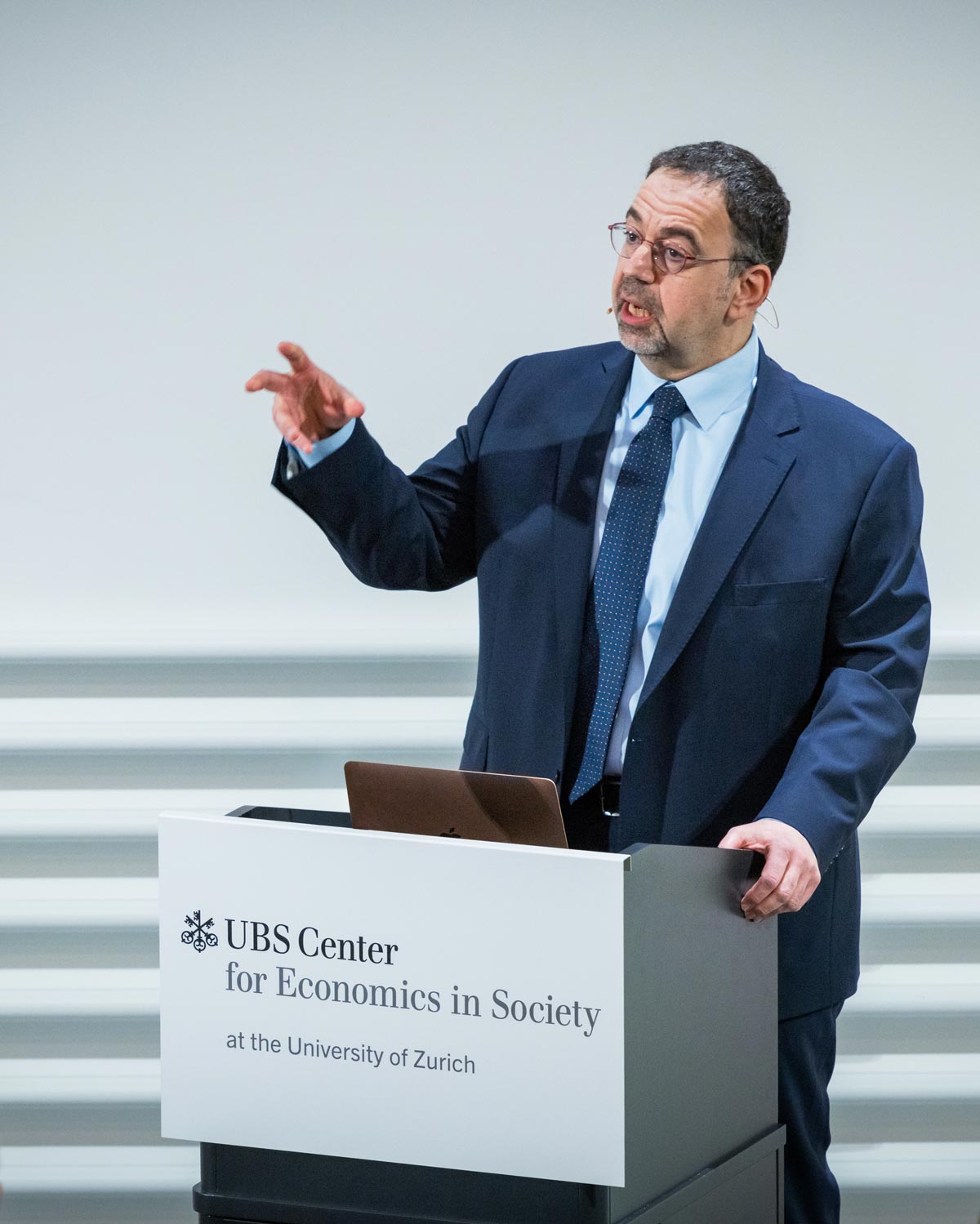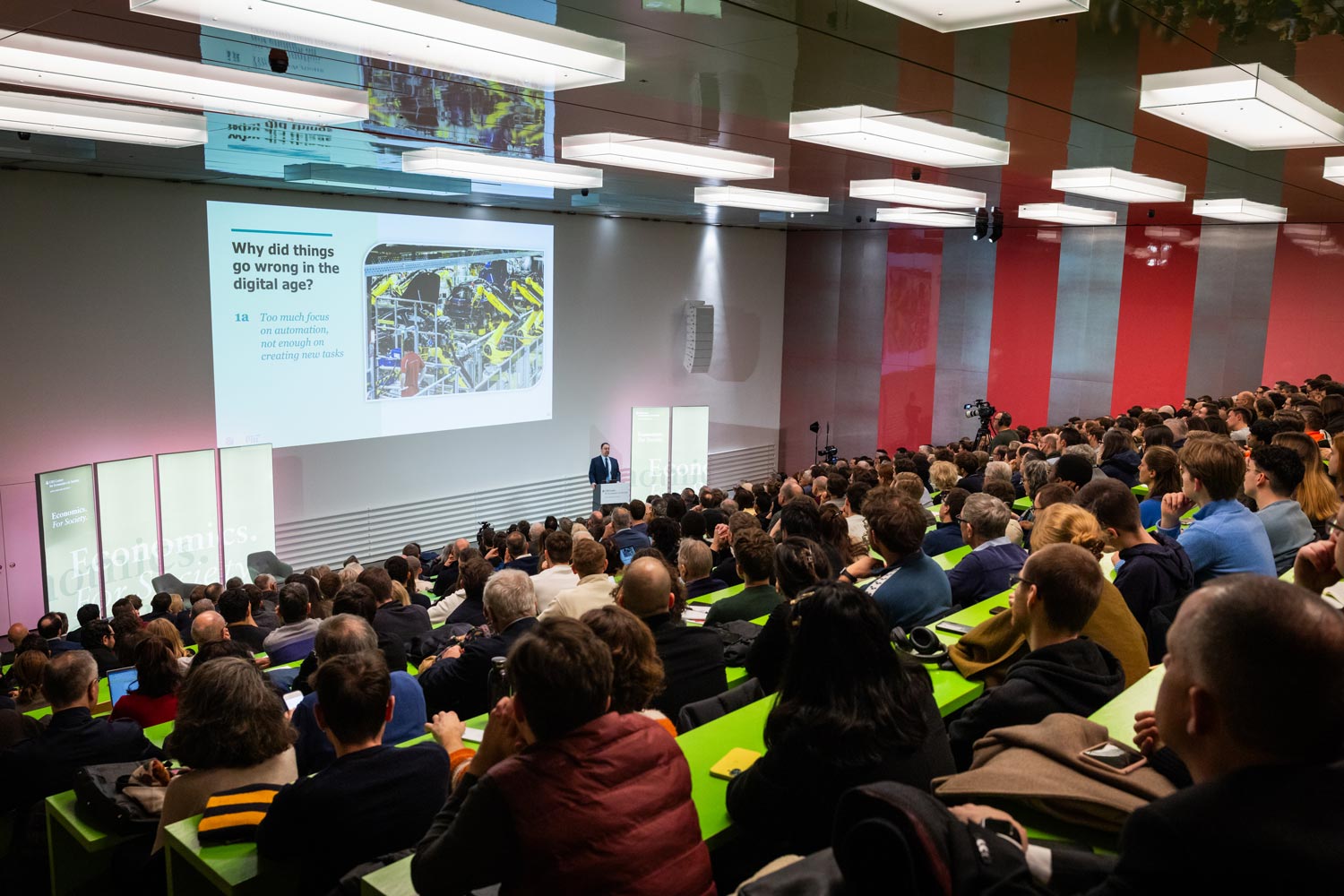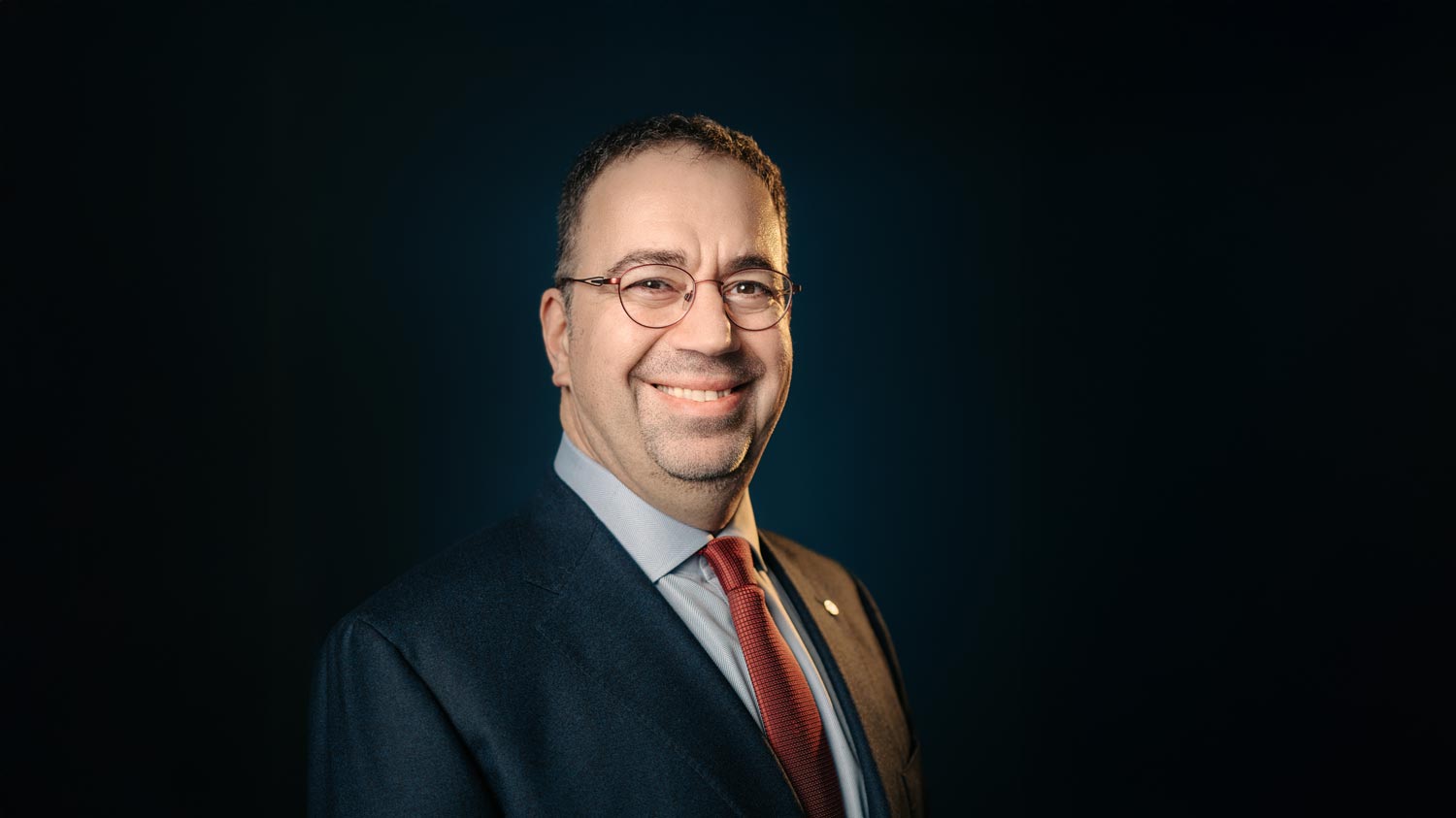Better AI for shared prosperity
Artificial intelligence has lately been reshaping nearly every sector of the economy, raising profound questions about the future of work, wealth, and power. Will these advancements enhance the intelligence and performance of human beings, or will they deepen inequality and keep on establishing power among a privileged few? In his lecture at UZH, Nobel laureate Daron Acemoğlu highlights the necessity of implementing suitable AI regulations to benefit society.
Tessa Rauber, Solenn Le Goff (Text) & Ueli Christoffel (Images)
These pressing concerns were at the heart of MIT economics professor and Nobel laureate Daron Acemoğlu’s lecture held at the University of Zurich, where he explored the economic and societal impacts of AI-driven technological change. The evening began with a warm introduction by Ernst Fehr, Director of the UBS Center for Economics in Society and professor at the Department of Economics at the University of Zurich.
Acemoğlu then took the stage, sharing insights from his 2023 published book “Power and Progress”, challenging the prevailing narratives of technological determinism. He argued that the future of AI is not preordained—it is shaped by the choices we make today.
Acemoğlu presented a series of recent technological breakthroughs which repeatedly concentrated wealth and power in the hands of a few before being redirected to serve society more equitably. He countered the “productivity bandwagon” argument that advancements in technology will increase productivity and benefit the worker. Regarding the question of when technological progress delivered shared prosperity, Acemoğlu stated: “Automation wasn’t the only thing that technology was doing, but technology was also creating new tasks”, later adding “I show that a lot of the inequality of our time in the United States can be understood as being related to how we are using machinery and how we are automating.”
Automation in the digital age falls short of its promises
Acemoğlu connected his research to the widespread excitement surrounding the economic implications of large-scale generative AI adoption, cautioning against its risks without proper safeguards and thoughtful regulation.
“Somehow, we are not getting the dividends out of technology. Why are we not getting the dividends? I think part of it is that we are not actually using technology the best way. The best way of using technology is making workers more productive,” Acemoğlu stated.
During his lecture Acemoğlu made an example by explaining that in many industries the evidence suggests that self-check-out-kiosks were what he liked to call “so-so automation”, which were hardly revolutionary and had limited productivity benefits. Understanding automation and the ways we misuse technology is crucial; without this knowledge, it will be not possible to fully grasp the impact on wages, inequality, and the decline of shared prosperity.
Who controls technology holds the power
Since the early days of computing, tech thinkers have envisioned technologies that would empower individuals. But they had already raised alarms about technology consolidating control within corporations—a concern that has materialized in recent years with a hand full of tech leaders playing a decisive role in shaping the direction of AI for the remaining eight billion people. “I think there is a danger that more and more people are seeing that AI advancements — even if they materialize — may end up benefiting a rather narrow segment of society, a technological elite,” Acemoğlu said.
Better AI for shared prosperity
Even though it remains unclear which path AI technology will take for society, Acemoğlu remains hopefull that redirecting AI technology is doable. Drawing a parallel with the development of the renewable energies sector, Acemoğlu offers some hopeful words on how AI needs to be properly regulated to reap the full benefits of the technology in the future, for everyone. “We should remain insitent that a redirection is feasible and should be part of the democratic conversation about what direction of AI should be”. The lecture was followed by a dynamic Q&A session, where attendees engaged with Professor Acemoğlu on topics ranging from the role of education in an automated world to “Will AI destroy humanity?”. The discourse underscored the audience's keen interest in understanding how societies can harness technological advancements for inclusive growth.
Artificial intelligence has lately been reshaping nearly every sector of the economy, raising profound questions about the future of work, wealth, and power. Will these advancements enhance the intelligence and performance of human beings, or will they deepen inequality and keep on establishing power among a privileged few? In his lecture at UZH, Nobel laureate Daron Acemoğlu highlights the necessity of implementing suitable AI regulations to benefit society.
Tessa Rauber, Solenn Le Goff (Text) & Ueli Christoffel (Images)
These pressing concerns were at the heart of MIT economics professor and Nobel laureate Daron Acemoğlu’s lecture held at the University of Zurich, where he explored the economic and societal impacts of AI-driven technological change. The evening began with a warm introduction by Ernst Fehr, Director of the UBS Center for Economics in Society and professor at the Department of Economics at the University of Zurich.


Personal profile
Turkish-American economist Daron Acemoğlu studied in the UK, where he earned his doctorate at the London School of Economics. Acemoğlu is one of the ten most cited economists worldwide and was awarded the 2024 Nobel Memorial Prize in Economic Sciences. He is currently the Elizabeth and James Killian Professor of Economics at MIT (USA). Acemoğlu has close ties with the Department of Economics at the University of Zurich, where he conducts research with several researchers on topics such as inequality and innovation. He is a regular guest at the department and gave the keynote address at the opening of the UBS Center for Economics in Society in 2012.
Turkish-American economist Daron Acemoğlu studied in the UK, where he earned his doctorate at the London School of Economics. Acemoğlu is one of the ten most cited economists worldwide and was awarded the 2024 Nobel Memorial Prize in Economic Sciences. He is currently the Elizabeth and James Killian Professor of Economics at MIT (USA). Acemoğlu has close ties with the Department of Economics at the University of Zurich, where he conducts research with several researchers on topics such as inequality and innovation. He is a regular guest at the department and gave the keynote address at the opening of the UBS Center for Economics in Society in 2012.

Video
Contact
Daron Acemoğlu is Elizabeth and James Killian Professor of Economics in the Department of Economics at the Massachusetts Institute of Technology and a member of the Economic Growth Program of the Canadian Institute of Advanced Research. His research covers a wide range of areas within economics, including political economy, economic development and growth, human capital theory, growth theory, innovation, search theory, network economics and learning. In the book "Why Nations Fail: The Origins of Power, Prosperity and Poverty" Daron Acemoğlu and James Robinson conclusively show that it is man-made political and economic institutions that underlie economic success (or the lack of it). Acemoğlu is the co-recipient of the 2024 Sveriges Riksbank Prize in Economic Sciences in Memory of Alfred Nobel for his groundbreaking work in institutional economics research.
Daron Acemoğlu is Elizabeth and James Killian Professor of Economics in the Department of Economics at the Massachusetts Institute of Technology and a member of the Economic Growth Program of the Canadian Institute of Advanced Research. His research covers a wide range of areas within economics, including political economy, economic development and growth, human capital theory, growth theory, innovation, search theory, network economics and learning. In the book "Why Nations Fail: The Origins of Power, Prosperity and Poverty" Daron Acemoğlu and James Robinson conclusively show that it is man-made political and economic institutions that underlie economic success (or the lack of it). Acemoğlu is the co-recipient of the 2024 Sveriges Riksbank Prize in Economic Sciences in Memory of Alfred Nobel for his groundbreaking work in institutional economics research.